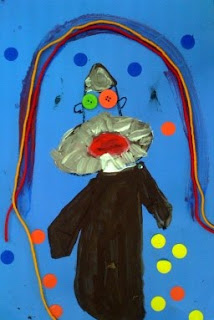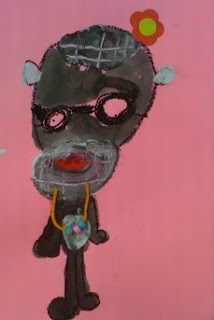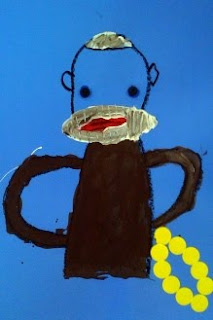


Kindergarten-First Grade
DISCUSSION: weaving as art form
Sock Monkey History: John Nelson, a Swedish immigrant to the United States, patented the sock-knitting machine in 1869, and began manufacturing work socks in Rockford, Illinois in 1890.[1] The iconic sock monkeys made from red-heeled socks emerged at the earliest in 1932, the year the Nelson Knitting Company added the trademarked red heel to its product. They were awarded the patent in 1955, and began including the pattern with every pair of socks
ARTIST: Arne Svenson
California-born
New York photographer
He had an obsession with sock monkeys for several years
PROJECT: Step One: Drawing the Monkey
Students should pick a BRIGHT piece of 12x18 construction paper
1 Draw two dots for eyes
2 below the dots draw a large sideways oval
3 draw a smaller oval inside
4 Add a line in the middle for the mouth.
5 Starting at the outside oval on the left hand side, draw a line up and around to the other side of the oval. This will become the head.
6 Draw a curved line at the top of the head for toe reinforcements.
7 Add two ears to the side of the head.
8 Draw a body and skinny arms.
Step Two: Paint Weaving:
Using white tempera paint, paint the mouth and the top of the head with white paint.
Let dry slightly and then paint over the white area with brown or black paint. The paint in this picture looks purple, .
Turn the brush around and with the tip, scratch lines away to create paint weaving.
Tip: Do not let brown paint dry. It's critical that the wet brown paint slide right over the dried white paint. Kids love this part!
Finish painting the body with brown or even gray paint (use the double-load technique with the black and white paint).
Then, use an oil pastel to trace over all painted black lines.
Step Three: Decorate your Sock Monkey
Set out tray fulls of embellishments and demonstrate a few easy ways to decorate the sock monkey. I show options for eyes, show how to cut a piece of paper to fit the head and even make simple pom-poms.
MATERIALS:
12 x 18" colored Tru-Ray Sulphite paper (construction paper)
Black oil pastel
brown, white and red tempera paint
Sequins, buttons, yarn, googlely eyes
Links: For additional information and more GREAT IDEAS!!!! check out http://www.deepspacesparkle.com/

No comments:
Post a Comment